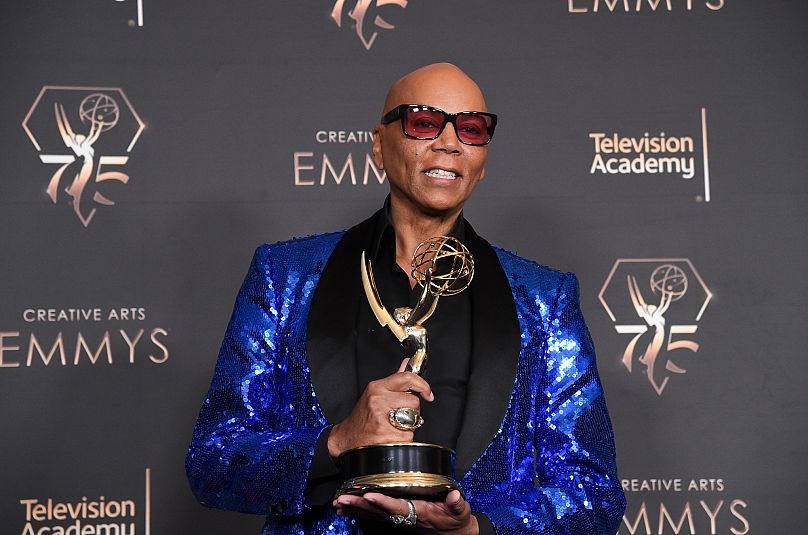 ADVERTISEMENT
ADVERTISEMENT After three publicly acclaimed seasons, some of the most beloved Drag Race France cast members returned to TV screens last month for France’s first All Stars edition.
However, audiences were surprised to see that singer and DJ Kiddy Smile, who had been a main judge since the show’s first season, would not reprise his role.
Fans speculated that his past positions against cultural appropriation and in defence of racially oppressed people had made him too political for the publicly-broadcast programme.
The reasons for Kiddy Smile’s absence have not been disclosed and he could well be back in future seasons. But the event exemplified the competing imperatives of a franchise that has brought the art of drag well into mainstream culture while attempting to preserve its deeply political roots.
Drag queen RuPaul Charles created RuPaul’s Drag Race in 2009 to look for “America’s next drag superstar.”
The series resembled classic reality television contests. It included challenges, eliminations and all the drama you could hope for – but with an extra dose of glitter, lavish wigs and gravity-defying heels.
The programme has since exceeded expectations. The original US version has aired for 17 seasons, and the franchise now includes international declinations in more than 15 countries, as well as various spin-offs and events.
Commodifying drag
Drag Race’s multimedia empire has revealed prominent artists, from Trixie Mattel and Vanessa Vanije in the US to Philippines’ Marina Summers and the UK’s Lawrence Chaney.
Iconic drag culture phrases have trickled down from the show to Gen Z vernacular. When you say that someone “slayed”, “ate” or is “mother,” you’re speaking drag.
But for some within the drag and LGBTQ+ communities, this success has also led to the commodification of an originally subversive art.
For French drag queen Emily Tante, Drag Race keeps raising the expectations placed on artists. “Judges want more and more fashion and extravagance,” she writes in the online queer Friction Magazine.
“The queens of the Drag Race franchise have gone into debt in the hope of winning this TV contest. This also leads to higher expectations from the audience.”
But in real life, doing drag is often financially unstable and many live performers struggle to get paid for their gigs.
Drag Race’s spotlight then becomes a precious but rare opportunity. “I still need a little more visibility to succeed in my projects,” drag queen Magnetica shared as she was facing elimination in the first episode of the current Drag Race France All Stars season.
“Drag has been girdled by the logic of competitive individualism and the free market,” researchers Zeena Feldman and Jamie Hakim wrote in a 2020 analysis.
They argued that the show’s mainstreaming of this art perpetuates “a culture that positions drag as an economic vehicle rather [than] as a means of mocking, querying or dismantling dominant power structures.”
“Not just an aesthetic”
The contest has often been accused of promoting a specific vision of drag, especially due to its exclusion of drag kings.
RuPaul also came under fire in the show’s earlier seasons for his reluctance to include post-transition trans women. Multiple transgender and non-binary contestants have since competed in the programme.
Drag’s inherent political nature is at the heart of Drag Race’s relationship with its viewers. Some consider that the show is too politicised. Others, not enough.
For former judge Kiddy Smile, drag is “not just an aesthetic,” but an art form that embodies queer history.
For instance, drag queens were central characters in the 1969 Stonewall riots, and since then, they have kept on fighting for LGBTQ+ rights and helped create safe spaces for marginalised groups.
“Drag subverts gender norms,” Kiddy Smile said in an Instagram post. “In communities where these norms are strongly valued, the mere presence of a drag queen becomes a gentle but extremely radical act of confrontation.”
Today, Drag Race is possibly the most widespread and popular expression of drag culture. The show is broadcast on public networks in several countries, including in France, Belgium and the UK.
It entertains audiences but also tackles questions like mental health, HIV and conversion therapy. Drag Race contestants also raise awareness on LGBTQ+ issues off screen, with the show’s US stars slamming Donald Trump’s “two genders” policy.
Several cast members also criticised the UK Supreme Court’s April ruling on the definition of the term “woman”.
For those directly involved, the Drag Race franchise remains a political space where, according to three-time participant Soa de Muse, “we are woke, we will stay woke, and we are proud of it.”
The first season of Drag Race France Superstar is currently screening.






